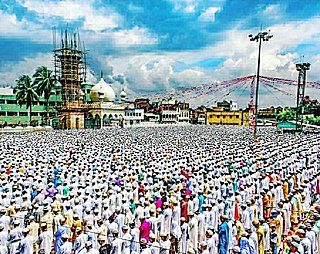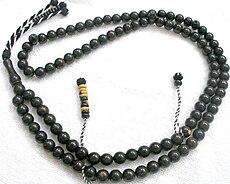
In Islam, duʿāʾ is a prayer of invocation, supplication or request, even asking help or assistance from God. Muslims regard this as a profound act of worship. Muhammad is reported to have said, "Dua is the very essence of worship."

The Isha prayer is one of the five mandatory salah. As an Islamic day starts at sunset, the Isha prayer is technically the second prayer of the day. If counted from midnight, it is the fifth prayer of the day.

In Islam, Friday prayer or Congregational prayer is a prayer (ṣalāt) that Muslims hold every Friday, after noon instead of the Zuhr prayer. Muslims ordinarily pray five times each day according to the sun's sky path regardless of time zones. Jumu’ah means Friday in the Arabic language. In many Muslim countries, the weekend is inclusive of Fridays, while in others, Fridays are half-days for schools and some workplaces.
Witr is an Islamic prayer (salat) that is performed at night after Isha or before fajr. Witr has an odd number of raka'at prayed in pairs, with the final raka'ah prayed separately. Therefore, as little as one raka'ah can be prayed, and eleven at most.

Qiyām is an integral part of the Islamic salah. The prayer begins in the standing position and some prayers only require the qiyām, such as Salat al-Janazah.

A rakaʿah, is a single iteration of prescribed movements and supplications performed by Muslims as part of the prescribed obligatory prayer known as salah. Each of the five daily prayers observed by Muslims consist of a number of raka'at.

Sujūd, or sajdah, is the act of low bowing or prostration to Allah in Islam facing the qiblah. It is usually done in standardized prayers (salah). The position involves kneeling and bowing till one touches the ground with the forehead, nose, palms, knees and toes, and remaining in that position until one attains a relaxed state while glorifying ALLAH thrice or more in odd number of times.

Ṣalāt al-Janāzah is the Islamic funeral prayer; a part of the Islamic funeral ritual. The prayer is performed in congregation to seek pardon for the deceased and all dead Muslims. The Salat al-Janazah is a collective obligation upon Muslims i.e., if some Muslims take the responsibility of doing it, the obligation is fulfilled, but if no-one fulfils it, then all Muslims will be accountable. Performing the funeral prayer when the body is not present is generally not permitted in the Hanafi and Maliki madhhabs, is permitted in the Hanbali madhhab, and is recommended in the Shafi‘i madhhab.
Tawassul is an Arabic word originated from wa-sa-la- wasilat. The wasilah is a means by which a person, goal or objective is approached, attained or achieved. In another version of the meaning of tawassul in another text: Tawassul is an Arabic word that comes from a verbal noun, wasilah, which according to Ibn Manzur in Lisān al-'Arab means "a station of King, a rank, or act of devotion". In other words, it refers to a position of power due to one's proximity to the king or sovereign. While the tawassul or tawassulan is the use of wasilah for this purpose. In religious contexts, the tawassul is the use of a wasilah to arrive at or obtain favour of Allah.

Eid prayers, also referred to as Salat al-Eid, are holy holiday prayers in the Islamic tradition. The literal translation of the word "Eid" in Arabic is "festival" or "feast" and is a time when Muslims congregate with family and the larger Muslim community to celebrate.
"Qunut" is a supplication type of prayer made while standing in Islam.

A Sunnah prayer is an optional or supererogatory salah that can be performed in addition to the five daily salah, which are compulsory for all Muslims. Sunnah prayer have different characteristics: some are done at the same time as the five daily compulsory prayers, some are done only at certain times, or only for specific occasions ; some have their own name and some are identified by how they are performed. The length of Sunnah prayer also varies.

Tasbih is a form of dhikr that involves the glorification of God in Islam by saying Subḥānallāh. It is often repeated a certain number of times, using either the phalanges of the right hand or a misbaha to keep track of counting.

Sitting or kneeling is an integral part of salah, or Islamic prayer, along with bowing.
The Duha prayer is the voluntary Islamic prayer between the obligatory Islamic prayers of Fajr and Dhuhr. The time for the prayer begins when the sun has risen to the height of a spear, which is fifteen or twenty minutes after sunrise, until just before the sun passes its zenith. When prayed at the beginning of its time it is called Ishraaq prayer. Salat al Duha is done to forgive sins and as a form of charity. Abu Dharr reports that Muhammad said: "Charity is required from every part of your body daily. Every saying of 'Glory to be to Allah' is a charity. Every saying of 'Praise be to Allah' is charity. Every saying of 'There is no God but Allah' is charity. Every saying 'Allah is the Greatest' is charity. Ordering the good is charity. Eradicating evil is charity. And what suffices for that are the two rak'as of Duha." This is related by Ahmad, Muslim, and Abu Daw'ud. It is also known in Bengali as Chashter Namaz and in Urdu as Namāz-e-Chāsht.

Islam Q&A is an academic, educational, da‘wah website which aims to offer advice and academic answers based on evidence from religious texts in an adequate and easy-to-understand manner. It is a website providing information regarding Islam. It was founded by renowned scholar Muhammad Al-Munajjid and it is the most popular website in the Muslim World especially in Arab.

Salah, also known as namāz and also spelled salat, are prayers performed by Muslims. Facing the qibla, the direction of the Kaaba with respect to those praying, Muslims pray first standing and later kneeling or sitting on the ground, reciting from the Quran and glorifying and praising Allah as they bow and prostrate themselves in between. Salah is composed of prescribed repetitive cycles of bows and prostrations, called rakat. The number of rak'ahs, also known as units of prayer, varies from prayer to prayer. Ritual purity and wudu are prerequisites for performing the prayers.

Salat al-jama‘ah or prayer in congregation (jama'ah) is considered to have more social and spiritual benefit than praying by oneself. When praying in congregation, the people stand in straight parallel rows behind the chosen imam, facing qibla. The imam, who leads the congregation in salat, is usually chosen to be a scholar or the one who has the best knowledge of the Qur'an, preferably someone who has memorised it in its entirety. In the first row behind the Imam, if available, would be another hafiz to correct the Imam in case a mistake is made during the performance of the salat. The prayer is performed as normal, with the congregation following the actions and movements of the imam as he performs the salat.
The Rain prayer is a sunnah salah for requesting and seeking rain water from God.

In Sufism, the lazimi or wird lazim is a regular litany (wird) practiced individually by followers (murids) in the Tijaniyya order.























